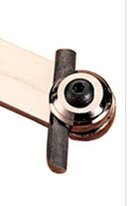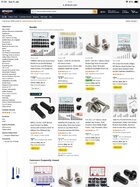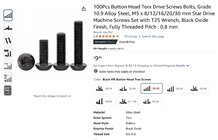-
Congratulations to Alex Bradley winner of the December 2024 Turning Challenge (click here for details) -
Conversations are now Direct Messages (click here for details) -
Congratulations to Gabriel Hoff for "Spalted Beech Round Bottom Box" being selected as Turning of the Week for January 6, 2024 (click here for details) -
Welcome new registering member. Your username must be your real First and Last name (for example: John Doe). "Screen names" and "handles" are not allowed and your registration will be deleted if you don't use your real name. Also, do not use all caps nor all lower case.
You are using an out of date browser. It may not display this or other websites correctly.
You should upgrade or use an alternative browser.
You should upgrade or use an alternative browser.
Sorby replacement screw—remind me again
- Thread starter Alan Weinberg
- Start date
The black allen head screw itself? A "button head screw"?
Should be able to find metric and 'Merican thread versions of those at good local hardware stores (not the "home improvement" stores). Take the tool with you and try out screws until you find the one that fits.
Should be able to find metric and 'Merican thread versions of those at good local hardware stores (not the "home improvement" stores). Take the tool with you and try out screws until you find the one that fits.
Any decent hardware store will have an assortment of possible replacements. It would be tempting to go stainless to prevent rust, but a magnet won't help you find it. (you know, that one time you drop it)
Ha! I believe in preemptive strikes!Amazon have them, if you don’t mind buying a few.
I love those hardware assortments and filled a tall tool box snd shelves with a variety of bolts, nuts, washer sets, in steel, brass, and stainless, imperial and metric, various head types. When I need something I don’t have I order an assortment. Another cabinet has assortment boxes of springs, cotter pins, o-rings, clips. SO handy.
I do recommend getting good thread gauges in imperial and metric. And don’t forget sets of taps, dies. Also helpful are those strings of thread testers you sometimes see at autoparts and hardware stores - they have both external and internal threads.
When I kick off someone can open a hardware store.
I buy most of my fasteners from eBay and always order more than I need.
I just checked four of my Sorby tools that have button head screws with hex sockets.
I have three different tools, two larger, and one small, with that attachment.
They all use the same thread: 3/16"x32. Some are about 5/8" long and a some are shorter, about 3/8" long.
All of these use a 1/8" allen wrench.
I have two other Sorbys made for texturing - they use different screws.
And you might use the search feature at the top right of the screen and locate the other thread.
JKJ
I have three different tools, two larger, and one small, with that attachment.
They all use the same thread: 3/16"x32. Some are about 5/8" long and a some are shorter, about 3/8" long.
All of these use a 1/8" allen wrench.
I have two other Sorbys made for texturing - they use different screws.
And you might use the search feature at the top right of the screen and locate the other thread.
JKJ
For very specialised screws (type, length, etc), McMaster-Carr is my go-to.
I’m surprised Sorby tools have imperial threads. I’d expect them to be M5 x .8 or M6 x 1.
I’m surprised Sorby tools have imperial threads. I’d expect them to be M5 x .8 or M6 x 1.
I checked mine with calipers, by the thread count, with both metric and imperial thread gages and with the metric and imperial thread testers. Mine are 3/16 x 32 tpi.
Of course, I didn't buy mine in the UK. Wouldn't make much sense to me but maybe they sell different hardware to different markets. Maybe there were different batches made at different times - mine are relatively old. Or maybe some are manufactured in different countries. Stranger things have happened.
I still recommend a person measure the thread of the tool in their hand. Without having the thread tester at home, if the screw is missing it might be easiest to carry the tool to the hardware or auto part's store or a mechanic and ask them to check the threaded hole with a tester or with a screw from their stock.
They are 10-32 x 5/8 inch. Ace didn’t have that size but got some 1/2 inch that may be ok. Thanks all.
As Robert Sorby is a UK company I doubt it.They are 10-32 x 5/8 inch. Ace didn’t have that size but got some 1/2 inch that may be ok. Thanks all.
I came across this post on another site that possibly explains the confusion. Possibly good enough for a non critical application but M5 screws aren’t difficult to source. Whether you need High Tensile 12.9, or stainless steel is good enough is another matter?
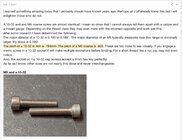
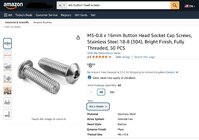
The worst part of the button head is the shallow recess for the wrench, it guarantees it will wear out sooner than later. A far better choice is the standard cap head, black not stainless as the stainless is soft and will wear out much like the button head. The black is high tensile and can take a lot of abuse before the need to replace.
Last edited:
and I learned that the length of the screw refers to thread length and not including the head—I’m new at this. So it’s a 10-32 x 1/2 inch. Found some on line. Shipping more than the screws.
Many years ago I found out from bitter experience that Hex socket screws, at least in the smaller sizes, are quite easy to round out, even in high tensile screws. Probably the worst for this are countersunk screws. If for any reason I have to use CS screws I go for the Torx variety whenever possible.The worst part of the button head is the shallow recess for the wrench, it guarantees it will wear out sooner than later. A far better choice is the standard cap head, black not stainless as the stainless is soft and will ear out much like the button head. The black is high tensile and can take a lot of abuse before the need to replace.
Cap Head socket screws are normally fine. I’ve used these down to M2.5 and not had any issues in the past.
I bought a Supernova 2 Chuck a while back and was pleased to see they had Torx screws rather than Hex that most other chuck manufacturers use.
I'm sort of in the same boat, Alan. I went to remove the screw and it was rounded out pretty quickly. Not needing the tool right then, I set it aside. I'll get back to it soon. Actually, that sounds like a good job for indoors since it's pretty cold here right now.
As Robert Sorby is a UK company I doubt it.
I came across this post on another site that possibly explains the confusion.
View attachment 70775
That's very interesting, thanks for sharing that.
I share your preference for Torx screws.
If stripping allen heads on any type of screw head: in working with thousands of screws I've never once stripped one UNLESS
First thing, use a T-handle allen wrench instead of a small angled one with a 90deg bend - it's far easier to keep a t-handle aligned properly.
Second, make sure there is no debris in the hole, sawdust, dirt, etc. A fine needle awl is good for checking and fine wire brush or comp air to clean.
Third, if the allen wrench is worn on the end simply grind off a tiny bit.
Fourth, if the screw is excessively tight apply a penetrating fluid like PB Blaster and wait 1/2 hour
Fifth, If that fails, apply heat then cold to the connection. A soldering iron is good for tiny screws. This will usually break loose even a rusted screw.
Very old trick for any stripped (protruding) screw head, phillips, allen, torx, etc: use a little thin cutting wheel on a Dremel and carefully cut a slot in the screw that perfectly fits a good flat-head screwdriver. This was an all-too common necessity when working on motorcycles back when they used phillips-head screws on the crankcase.
I have five sets of t-handle allen wrenches, both metric and imperial, in my shop. Sets like these mount nicely on the wall with a couple of screws.
These were the last I bought, they seem fine.
Allen wrench sets that fit on 3/8" socket handles are also good when the going gets tough, especially for larger connectors. I also use these with T-handle socket handles.
As for flat tipped screwdrivers, the best I know of are marketed to gunsmiths and have parallel tips instead of wedged tips. (Gunsmith do not like it when screwdrive slips and mars someone's gun!) I do grind the ends of some screwdrivers parallel. I am partial to Grace tools:
JKJ
- the wrong size allen wrench was used OR
- the allen wrench was worn or rounded on the end.
First thing, use a T-handle allen wrench instead of a small angled one with a 90deg bend - it's far easier to keep a t-handle aligned properly.
Second, make sure there is no debris in the hole, sawdust, dirt, etc. A fine needle awl is good for checking and fine wire brush or comp air to clean.
Third, if the allen wrench is worn on the end simply grind off a tiny bit.
Fourth, if the screw is excessively tight apply a penetrating fluid like PB Blaster and wait 1/2 hour
Fifth, If that fails, apply heat then cold to the connection. A soldering iron is good for tiny screws. This will usually break loose even a rusted screw.
Very old trick for any stripped (protruding) screw head, phillips, allen, torx, etc: use a little thin cutting wheel on a Dremel and carefully cut a slot in the screw that perfectly fits a good flat-head screwdriver. This was an all-too common necessity when working on motorcycles back when they used phillips-head screws on the crankcase.
I have five sets of t-handle allen wrenches, both metric and imperial, in my shop. Sets like these mount nicely on the wall with a couple of screws.
These were the last I bought, they seem fine.
Allen wrench sets that fit on 3/8" socket handles are also good when the going gets tough, especially for larger connectors. I also use these with T-handle socket handles.
As for flat tipped screwdrivers, the best I know of are marketed to gunsmiths and have parallel tips instead of wedged tips. (Gunsmith do not like it when screwdrive slips and mars someone's gun!) I do grind the ends of some screwdrivers parallel. I am partial to Grace tools:
JKJ
I use good quality hex drivers like *Bondhus whenever possible, and most of them are T handle types. The problem with some fasteners, even good quality high tensile ones like those made by Unbrako, is that with for example countersunk screws, the socket is smaller than the same size thread on a cap headed screw.If stripping allen heads on any type of screw head: in working with thousands of screws I've never once stripped one UNLESS
Or if the screw was cheaply made I trash it. When possible, I prefer to buy from a local commercial fastener company in Knoxville.
- the wrong size allen wrench was used OR
- the allen wrench was worn or rounded on the end.
First thing, use a T-handle allen wrench instead of a small angled one with a 90deg bend - it's far easier to keep a t-handle aligned properly.
Second, make sure there is no debris in the hole, sawdust, dirt, etc. A fine needle awl is good for checking and fine wire brush or comp air to clean.
Third, if the allen wrench is worn on the end simply grind off a tiny bit.
Fourth, if the screw is excessively tight apply a penetrating fluid like PB Blaster and wait 1/2 hour
Fifth, If that fails, apply heat then cold to the connection. A soldering iron is good for tiny screws. This will usually break loose even a rusted screw.
Very old trick for any stripped (protruding) screw head, phillips, allen, torx, etc: use a little thin cutting wheel on a Dremel and carefully cut a slot in the screw that perfectly fits a good flat-head screwdriver. This was an all-too common necessity when working on motorcycles back when they used phillips-head screws on the crankcase.
I have five sets of t-handle allen wrenches, both metric and imperial, in my shop. Sets like these mount nicely on the wall with a couple of screws.
These were the last I bought, they seem fine.
Allen wrench sets that fit on 3/8" socket handles are also good when the going gets tough, especially for larger connectors. I also use these with T-handle socket handles.
As for flat tipped screwdrivers, the best I know of are marketed to gunsmiths and have parallel tips instead of wedged tips. (Gunsmith do not like it when screwdrive slips and mars someone's gun!) I do grind the ends of some screwdrivers parallel. I am partial to Grace tools:
JKJ
I made a trigger unit many years ago and used M4 countersunk screws for the cover, I couldn’t use screws any larger due to the thickness of the side plates. I needed to remove the side plate one day and found that due to repeated vibration the screws had self tightened. They were all difficult to remove and the socket on one of them rounded out. I had to drill it out in the end. I learnt my lesson and avoided using CS socket screws whenever possible, especially in the smaller sizes. As mentioned I’ve never had a problem with cap head socket screws.
*Bondhus have the best range of Hex drivers in my view. No one else seems to make long and extra long T drivers for those awkward to reach screws on some machines. They also don’t injection mould plastic T handles over standard hex keys like virtually all the other sets you see. The T handle is welded on and then plastic dipped. Well worth the extra cost.
T-Handles Hex End
I’m a bit less demanding in tool selection when it comes to Torx drivers because I doubt you could ever round one out?!
Edit: It’s not just me that think Bondhus are good: 😉
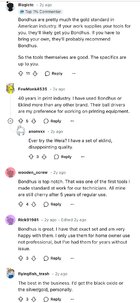
Last edited:
I use good quality hex drivers like *Bondhus whenever possible, and most of them are T handle types.
Thanks for the advice. I ordered a couple of sets to try. Never can have too many t-handled allen wrenches.
JKJ
I have a couple of the Ball ended ones for those fasteners that some manufacturers seem to place in difficult to reach places on some machines! 😆
Thanks for the advice. I ordered a couple of sets to try. Never can have too many t-handled allen wrenches.
JKJ
I should buy a set. Then I can throw out the 412 allen wrenches I have scattered all over now. Just about everything you buy these days is "some assembly required" and they all come with allen wrenches.
These are some of my T handle drivers. The long ones are ball ended. The green one is Torx.
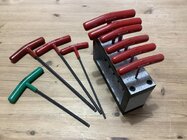
Edit: I’m not sure what other hobbies you guys get up to but I used to keep this combined Metric/Imperial set in my gun box.
It came in very useful for things like scope mounts that sometimes had odd size fasteners.
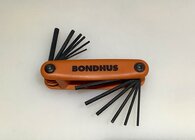

Edit: I’m not sure what other hobbies you guys get up to but I used to keep this combined Metric/Imperial set in my gun box.
It came in very useful for things like scope mounts that sometimes had odd size fasteners.

Last edited:
What brand? I’m looking.I ordered a couple of sets
Buy the best, Bondhus! 😊What brand? I’m looking.
T-Handles Hex End
I’ve read these are very good as well but I’ve not tried them myself.
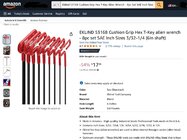
Last edited:
- Joined
- Feb 28, 2021
- Messages
- 1,450
- Likes
- 1,273
- Location
- Roulette, PA
- Website
- www.reallyruralwoodworks.com
Those Eklind, I HATE THEM - Not for quality but, when you're working to loosen a rather tight screw and then it pops loose, those handles have a way of twisting under torque and when they "snap" back, trust me, it hurts. I'd as soon spend extra and get the Bondhus too.I’ve read these are very good as well but I’ve not tried them myself.
Those Eklind, I HATE THEM - Not for quality but, when you're working to loosen a rather tight screw and then it pops loose, those handles have a way of twisting under torque and when they "snap" back, trust me, it hurts. I'd as soon spend extra and get the Bondhus too.
For a tough screw (after letting some PB Blaster soak in) I sometimes tighten a good quality adjustable wrench on the hex key near the screw and apply torque with both the handle and the wrench at the same time.
JKJ
- Joined
- Feb 28, 2021
- Messages
- 1,450
- Likes
- 1,273
- Location
- Roulette, PA
- Website
- www.reallyruralwoodworks.com
Yup, I often did that as well. The times I had that happen were basically working with brand new machinery (doing setup adjustments) - not a ton of torque involved, but they could be tight enough for the handles to twist and snap back... I had a few of those allen wrenches for a while, but quickly replaced them with solid handle t-handles.For a tough screw (after letting some PB Blaster soak in) I sometimes tighten a good quality adjustable wrench on the hex key near the screw and apply torque with both the handle and the wrench at the same time.
JKJ
One of the things I liked about the look of the Elkind is that you can see they are solid steel. Many, most or maybe all the other ones with solid plastic handles seem to encapsulate ordinary hex keys. I had one of this type years ago, a 6mm. Whilst using it on an M8 screw the plastic broke away. It hurt my hand a little but luckily didn’t cause any damage.Those Eklind, I HATE THEM - Not for quality but, when you're working to loosen a rather tight screw and then it pops loose, those handles have a way of twisting under torque and when they "snap" back, trust me, it hurts. I'd as soon spend extra and get the Bondhus too.
Bondhus also make “skeleton” style hex drivers like the Elkind.

